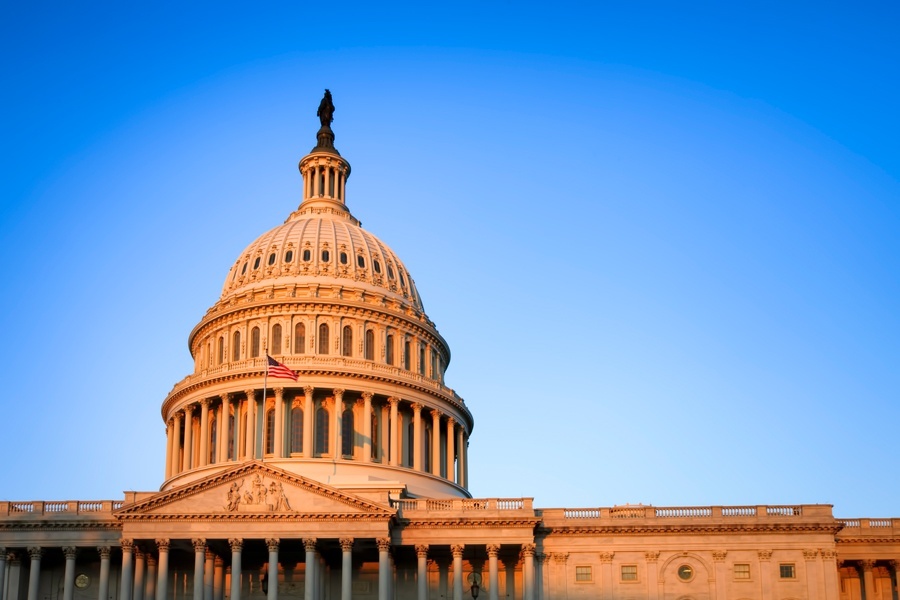

The House passed a $78 billion business and child tax break bill that would provide a boon for US companies with large capital and domestic research expenditures and hand President Joe Biden an election-year political victory.
The measure, which was approved by a vote of 357 to 70, now heads to the Senate, where lackluster Republican support threatens to sink it over a provision that would allow some people with no taxable income to collect the child tax credit and other concerns.
Senate Republican leader Mitch McConnell has been silent on the bill and the top Republican tax-writer Mike Crapo has said Republicans could offer “hundreds” of amendments on the Senate floor.
But the lopsided House vote in favor signals to Senate holdouts that a majority of both parties is in favor of the deal.
Opposition to the bill, which also drew objections from some House conservatives, is the latest indication of the growing divide between Republicans and the business interests the party once unflinchingly championed.
A coalition of 250 business groups including the US Chamber of Commerce, Business Roundtable and National Association of Manufacturers has lobbied hard for the legislation authored by Ways and Means Chairman Jason Smith and Senate Finance Chairman Ron Wyden.
Boeing Co., General Motors Co., Deere & Co., Caterpillar Inc., Amazon.com Inc., Microsoft Corp. and Apple Inc. are among the companies that stand to benefit, according to Bloomberg Intelligence.
The measure would restore expired tax breaks allowing businesses to more quickly recoup the costs of domestic research and development, interest on business loans and investment in equipment.
The research tax break would be retroactive to the 2022 tax year, so manufacturers and technology companies would see a large immediate benefit. The return of the full capital expensing perk would benefit companies that are highly capital-intensive.
House Speaker Mike Johnson defended the deal, pointing out that it extended provisions of former president Donald Trump’s business tax overhaul and clawed back billions from a coronavirus program. Smith stressed that the bill allows, for the first time, low-income families to claim the credit for multiple children while also maintaining a work requirement.
“It’s both pro-worker and pro-family,” Smith said.
But House hardliners, and some Senate Republicans, have argued that the bill’s expansion of child tax credit payments for the working poor could discourage work.
“This expands the welfare state,” said House Freedom Caucus chairman Bob Good.
The Joint Committee on Taxation, the official scorekeeper of Congress, has found negligible effect on the economy and labor market from the bill.
Other Republicans say the measure would allow US children of undocumented immigrants to qualify for the credit. That’s already a feature of current law — signed by Trump.
The White House and congressional Democrats support the bill even though progressives wanted a more generous child tax payments. Enactment of the bill would allow Biden to make good on a promise to expand the child tax credit.
The bill allows more of the $2,000 per child tax credit to be paid to individuals with low income and bolsters payments to low income filers with multiple children. The maximum credit would be indexed to inflation for two years starting in 2024.
The bill extends a tax credit for the construction of low income housing and has tax breaks for disaster victims. It also includes a double taxation agreement with Taiwan, a provision that irks China.
To attract a group of New York Republicans from high-tax areas, Johnson has also promised a separate vote as soon as next week on a bill doubling the $10,000 state and local tax deduction cap for joint filers, according to three people familiar with the agreement.
That SALT cap bill is unlikely to pass given widespread opposition from conservative Republicans and some progressive Democrats. But the vote itself is a political win for the New Yorkers, many of whom represent districts Biden won in 2020. Republican leaders, according to people familiar with the matter, planned to begin work Thursday on the SALT measure in the Rules Committee, which sets parameters for floor debate.
The White House, in a statement on Wednesday night, urged the Senate to pass the bill and send it to Biden for his signature.

Summit Financial unveiled a suite of eight new tools, including AI lead gen and digital marketing software, while MassMutual forges a new partnership with Orion.

A new analysis shows the number of actions plummeting over a six-month period, potentially due to changing priorities and staffing reductions at the agency.

The strategic merger of equals with the $27 billion RIA firm in Los Angeles marks what could be the largest unification of the summer 2025 M&A season.

Report highlights lack of options for those faced with emergency expenses.

However, Raymond James has had success recruiting Commonwealth advisors.
Orion's Tom Wilson on delivering coordinated, high-touch service in a world where returns alone no longer set you apart.
Barely a decade old, registered index-linked annuities have quickly surged in popularity, thanks to their unique blend of protection and growth potential—an appealing option for investors looking to chart a steadier course through today's choppy market waters, says Myles Lambert, Brighthouse Financial.
